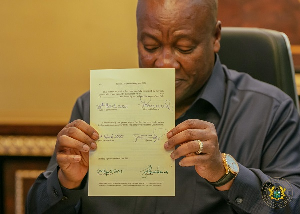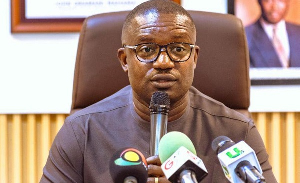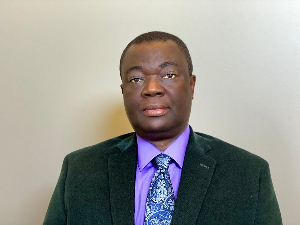A GNA feature by Nathaniel Glover-Meni
Many an average Ghanaian policy maker would find it very difficult to place the right value on culture in the socio-economic pursuits of this beloved country of ours. Ask an average Minister of State; Legislators from both sides of the aisle, and District Chief Executives to evaluate the true value of culture in the national development effort and the chances are that he or she would flunk it.
If by any stroke of luck some of these people are able to make any serious attempt at the question, the answer would be a definition of culture as a way of life.
If one perused the speeches of Ministers of State and other high ranking officials in Ghana that is all they are able to say about culture and not much else. Obviously, this begs the question as to whether they understand the value and place of culture in the national economic development ethos.
Some may argue that their speeches are written for them by technocrats and therefore, could not be blamed. However, one could counter: Do you read anything just because it has been prepared for you? Anyone versed in the national culture knows that reading anything without first checking, makes one "Simpa Payin".
A national development effort must have a philosophy which must hinge on indigenous culture. Needless to say that culture is central to development, albeit, a noteworthy aspect of national life which is yet to receive critical attention in the pressing quest for regeneration, and for any conscious African, this repeated letdown to rejuvenate the Continent's culture is responsible for the failure to develop. Chief Directors, Heads of Ministries, Departments and Agencies, and surprisingly, Politicians, who claim to be agents of development, do not appreciate this reality.
So what happens to the rest of the run-of-the mill? We are roast to foreign cultures and unfamiliar to our own. This is the simple reason for our underdevelopment; other issues are symptomatic of that predicament.
Perhaps, the anomaly is due to the fact that culture has not been recognized as one of the veritable touchstones in stimulating national development. The straight forward fact, however, is that culture is central to development, not a supplement to it.
Astoundingly, there have been sufficient works that establish the verity that a nation develops only when it focuses on its culture and not vice versa. As long as Ghanaian policy makers pack off this facet to the cellar, so long would they be reflexively hyphenating Ghana's development to the future, in spite of the punctilious attempt to present economic development as something of essence.
Many studies by both Africans and non-Africans including a wide ranging one conducted by the eminent historian, Professor Ali Mazrui, have clearly confirmed that Africa could only develop if it turned to its culture.
Professor Mazrui, for instance, based his declaration on the fact that no rich nation ever accomplished its scale of economic growth by disserting its culture.
In a book dedicated to the subject entitled, The Muse of Modernity: Essays on Culture as Development in Africa", Professor Mazrui made some disquieting observations as to why Africa's neglect of her culture was responsible for the Continent's underdevelopment.
He argued thus: "What is development? One possible answer is that development is modernization minus dependency . Where does culture enter into all of this? If development equals modernization minus dependency, there is no doubt about the relevance of African culture in at least the part of the equation that concerns "minus dependence". African culture is central to the process of reducing dependency in the dialectic of modernization" (emphasis supplied).
Mazrui postulates that one strategy for Africa to transcend its state of underdevelopment is to follow a policy of indigenization. This process, he explains, includes the identification and development of greater utilization of indigenous techniques, personnel and approaches to purposeful change.
Mazrui states: "Indigenized modernization should include greater use of African languages in the pursuit of economic and constitutional change." As stated earlier, no country has ascended to the level of a first-rank economic power by excessive dependence on foreign language. "Japan rose to dazzling industrial heights by "scientificating" the Japanese language and making it a medium of Japan's industrialization.
Korea has done this for the Korean language, making it the medium of its own technological takeoff. Can Africa ever "take off" technologically if it remains so overwhelmingly dependent on European languages for discourse on advanced learning? Can Africa look to the future if it is not adequately sensitive to the cultural past? Culture as communication and culture as production need to converge . Taking African languages seriously would have to include a patronage of literary arts and an effort to sustain the infrastructure of publishing in indigenous languages, as well as in international languages . culture as communication and culture as identity should find a meeting point in literature".
Mathew Arnold, who studied extensively the nexus between culture and literature on one hand and development on the other, recorded his observations in the timeless publication, Culture and Anarchy (1869). Culture, he defined as a study of perfection, not merely as a way of life, which we are so mechanically used to in Ghana: "It is a study of perfection. It moves by the force, not merely or primarily of the scientific passion for the pure knowledge, but also of the moral and social passion for the doing good."
Arnold, like Mazrui, argues that culture is the best option in tackling the development challenges confronting countries like Ghana. Culture, he preached, is a "great help out of our present difficulties." As the title of Arnold's book indicates; culture has an antithetical force - anarchy. If culture is seen as "crystallization of all that is best in a society, then "anarchy" is the risk to that desired destination (Glover-Meni, 2008)".
Arnold claims that "anarchy" poses a danger to the whole fabric of society, but this scourge, he opined, is easily defeated by the combined letting of culture and literature, a determination Mazrui also makes. Arnold's view of culture imposes certain obligations on us as a nation and also on the individual.
Culture forbids individualism and, therefore, we should not sit unconcerned when some ambitious individuals wreck the common weal because of their unrestrained quest for material gains at the expense of the majority.
Unfortunately, for a people grappling with underdevelopment, this point has been lost on us, especially in recent decades although a blue print at the continental level has been developed on its applications decades ago. Even non-indigenous scholars have established this fact and our pretence not to know it is hurting the performance of our economy.
Dr Stephanie Newell of the Sussex University, for example, established in a study on West African culture, politics and literature that the creation of political identities in the Sub-Region has involved throughout a great deal of literary and cultural activity: "Journalists, authors, poets and intellectuals have played especially prominent roles in the political history of the Region since the 1880s . the involvement of writers in the production of resistant and oppositional identities is a key feature of West Africa's cultural history, emerging out of praise-singer roles. Political activism and creative writing have been inseparable in West Africa since at least the 1880s."
In effect, we cannot separate politics from cultural re-engineering; otherwise our development shall continue to be in a limbo and the media has a key role to play in this regard. Zulu (1996) explains in his "Rebuilding Africa through the Media" that moving Africa from a third world to a developed status must advance with a conscious effort to revivify the Continent's culture. "Accurate self-awareness enables a national population to share the languages and values that allow people to objectively understand the predetermined elements of their existence. With this understanding, people become active and productive members of society, contributing to progress and development.
The failure to restore the functional and dynamic aspects of African cultures has further undermined African people. The energy and spirit that drove the struggle for independence did not transform themselves into a post-independence force to forge new destinies in which African cultures were equal to other cultures of the world". One of the enduring notions of culture is the fact that it often serves as a transmittable outlet for diffusing knowledge through folklore and other story telling methods.
Like literature, culture helps in the transmission of knowledge (ideas), norms and values of a given people and, therefore, can serve as a good medium to change negative mindsets, ranging from environmental problems to ethnic animosities by creating both vertical and horizontal integration of identity using the linguistic patrimony of the people. By this, people's attitude will be shaped in a productive way. Against this backdrop, it is surprising that literature no longer plays a crucial part in national life so as to galvanize the people against poverty and destitution similar to the role it played in flinging the colonial yoke.
Our proneness to everything foreign and the failure to rejuvenate our culture will continue to injure us for a very long time to come. Promoting culture, and by extension literature, would promote greater integration, greater cohesion, understanding of not only our world but its relation to the greater world.
As Mazrui underlined "a non-Western route to modernity is possible for Africa provided African culture is fully mobilised as an ally in the enterprise. In effect, Ghana needs a "cultural nationalism" (Ogungbesan) as part of anti-development campaign in the hunt for a fitting retort to the political moment of our society.
Policy makers should be impelled by the sheer level of deficiency Ghana faces to start developing home-grown ideas in tackling these problems. A proponent of this view is literary critic Professor Ngugi wa Thiogo, who links Africa's political independence to cultural independence, insisting that "political independence could not be total without cultural independence".
Similar views about culture and nationhood are enshrined in Ghana's Cultural Policy (2004), which focuses on the promotion of "national consciousness, national self-sufficiency and a strong sense of national identity".
The Organization of African Unity (OAU), now African Union (AU), in its "Cultural Manifesto" (1969), notes, among other things that: "The peoples of Africa believe . that liberty is one and the same as nationhood; and the welfare and progress of our people have to be achieved around our specific personality. They naturally accepted that liberty, nation and personality are essentially the origin and product of culture."
Correspondingly, Kwabena Nketia (1996), the highly respected Emeritus Professor at the University of Ghana states the transformative role of culture in national development. To him, African countries must value culture and the performing arts not only for their traditional role as a source of aesthetic enjoyment and as a medium of communication, but also for their "creative potential and the contemporary role they play in national development".
The point being made here is that African authorities must wake up and value culture as vehicle for mental and economic growth through imaginative expression of ideas relating to black identity. In this regard, the Government must devise conscious programmes to ensure that African imaginative and artistic ideals are embedded in Ghana's educational policies.
As Professor Ama Ata Aidoo noted recently, culture is the "oil that keeps society running", and as such, there is the need for our educational authorities to develop a policy that helps students to absorb modern ideas and expertise within their own cultural milieu. Professor Kofi Asare Opoku, Vice President of the African University College of Communication, is a proponent of this view, demanding that policy makers in the education sector must include the nation's rich traditional beliefs and practices into the school's curriculum. "Some countries like Malaysia, Japan and China have chalked lots of successes in all spheres of life because they appreciated and used their culture to develop their nations . I believe if we start teaching pupils these culture from the onset, they will be better informed as to why some of the rich traditions are needed for development".
This calls for the revamping of national institutions that would engender cultural development, which have been neglected by the State over the years. These include the Bureau of Ghana Languages; National Dance Company; National Folklore Board and the National Symphony Orchestra.
Mozart's name alone is a sufficient advertisement for his Austrian society more than 100 years after his death. What have we done about the works of Ephraim Amu; Nayo; Kpakpo and Nketia among others? Could we, for instance, make it a policy that only choral music should be relayed at State events?
Discussing the provenance of drumming, choral songs and dance in Ghana, Nketia said their celebration "constituted a symbolic affirmation of the declaration of independence and the re-conceptualization of the arts as national arts".
This process, he said, enabled them to be used in fostering national consciousness. Prof Asare agrees to this proposition, noting that drums play a special role that included entertainment and the giving of advice to the people through the sounds they produced. Fontomfrom drum beats and other oral performances often insert current affairs and moral debates into their narratives to promote order in the society. However, this bars inimical practices, especially those bothering on human rights abuses.
Going forward, the Government must have a well articulated policy as part of the development agenda of the country. The President must articulate clearly in the next sessional address what role culture would play in his government.
He must satisfy the fact that Ghanaian art and humanities capacity-building strategies might enable culture to make its two main contributions to development: Promoting an understanding of how best to secure the creation of and adaptation to technological forms of development; and shaping its own destiny - with regard to identities, social cohesion, group aspirations, personal well-being and satisfaction (Pwono, 1996). Until this is done our development remains postponed. And until that day, this Writer can affirm stoutly that if you bet policy makers to a contest on the relevance of culture to economic development they would bomb.
Placing the right value on culture in the national development effort is a task that must be done. Chief Directors, Heads of Ministries, Departments and Agencies and Politicians should appreciate the reality that the situation is awful enough to demand immediate attention.
An Akan adage states:"If one forgets the sound of the horn of one's traditional ruler, one gets lost in a big gathering." Africa would continue to chase the shadow instead of the substance until its policy makers placed the right value on culture in its development efforts. "If one does not know where one is coming from, one cannot know one's destination," another Akan adage states. 5 Aug. 09
Opinions of Saturday, 8 August 2009
Columnist: GNA














